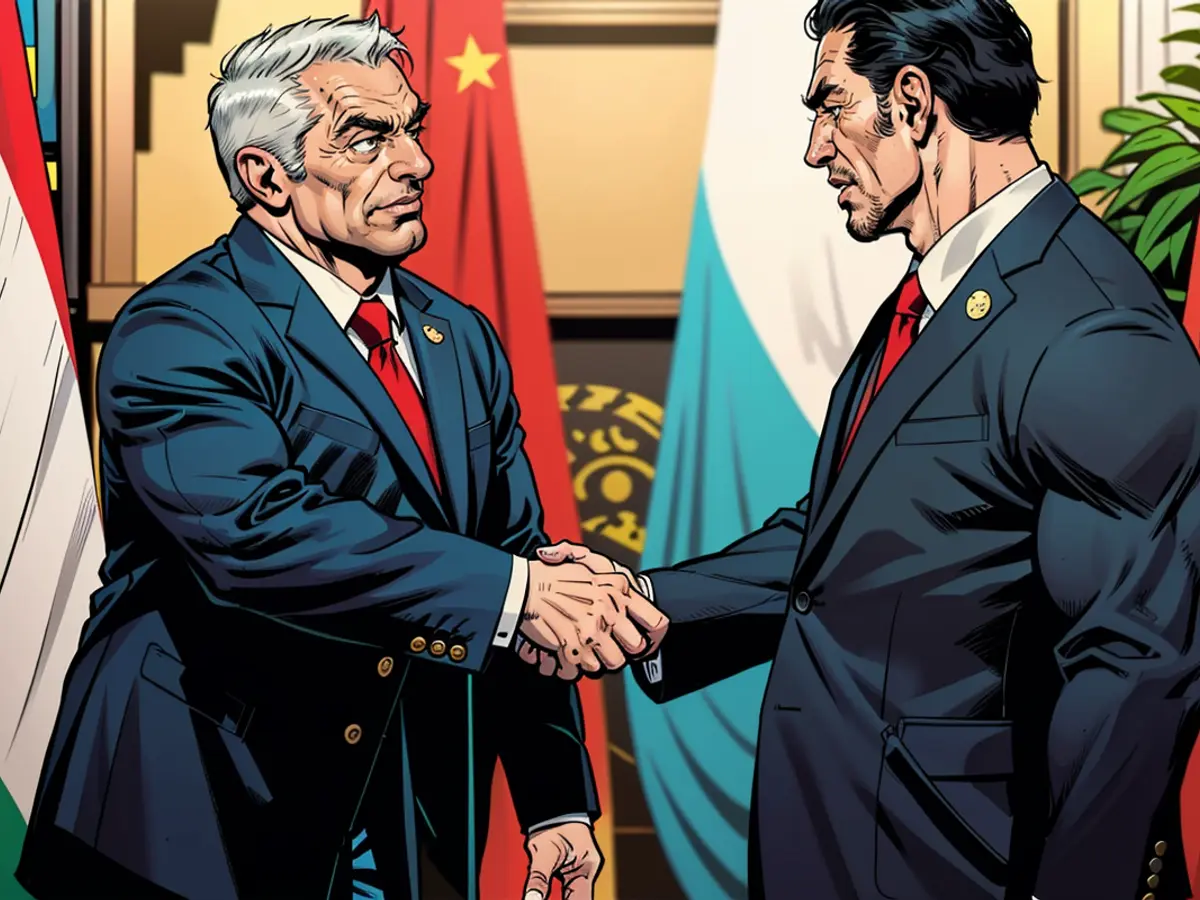Talks on the war in Ukraine - Hungarian Prime Minister Orban makes a surprise visit to China
On his "Peace Mission" state tour, Hungary's Prime Minister Viktor Orban unexpectedly visited China. Chinese state media reported in the morning (local time) about the arrival of the Hungarian government chief in Beijing. Orban wrote on social media platform X, "#PeaceMission 3.0 #Beijing". He also published a photo there showing him being greeted by Chinese Vice Foreign Minister Hua Chunying at the airport. Previously, he had traveled to Moscow and Kiev.
Meeting with Xi
According to China's official news agency Xinhua, Orban met with Chinese State and Party Chief Xi Jinping in Beijing. The Russian military campaign in Ukraine was at the top of the agenda. Orban wrote in another post on X, China is a "key player" in generating conditions for peace in the war.
Also present was Hungarian Foreign Minister Peter Szijjarto, as he announced on Facebook. Originally, Szijjarto was supposed to meet with Foreign Minister Annalena Baerbock (Greens) in Budapest. The visit was, however, suddenly canceled. The Hungarian Foreign Ministry justified this with an "unforeseen change in the calendar" for Szijjarto.
According to the Foreign Ministry, a serious and sincere personal conversation between both foreign ministers would have been important in view of the unexpected and unscheduled Moscow visit by Prime Minister Orban. The visit was reportedly rescheduled. Hungary had taken over the EU Council Presidency on July 1.
China's Role
China is Russia's most important ally. The People's Republic maintains close economic and political exchanges with Moscow. Beijing is therefore attributed much influence regarding Russia's actions in Ukraine. Externally, China presents itself as neutral. However, Western countries accuse China of supporting Moscow's defense industry and thus the war through the export of crucial technology and equipment.
At the previous peace conference on the Ukraine War in Switzerland, Beijing had withdrawn. The necessary prerequisites for China's participation had not been met, it was said. The communist government wanted to work on a peace solution on its own. The main reason for the withdrawal was suspected to be that Russia was not present.
Previous Visit to Russia
On Friday, Orban was welcomed by Russian President Vladimir Putin during his controversial visit to Moscow. Orban had also staged the meeting with Putin, whose country has been waging war against Ukraine for more than two years, as a "Peace Mission". Many EU top politicians criticized the trip.
European Commission President Ursula von der Leyen made it clear that she sees Orban's solo venture as a threat to the credibility of the European Union. Federal Chancellor Olaf Scholz (SPD) made it clear that Orban traveled to Putin as Hungary's prime minister and not as the EU's foreign policy representative.
Good Relations between China and Hungary
Xi was in May on a Europe tour in Hungary as well. Budapest and Beijing have had good relations for a longer time. Orban was one of the few European representatives and the only EU government head who participated in China's Forum on the "New Silk Road" in October. Hungary is also part of that Chinese investment project with which the People's Republic implements infrastructure projects worldwide and thus expands its influence.
- Despite the ongoing conflicts in Ukraine, Hungary's Prime Minister Viktor Orban decided to embark on a "Peace Mission" state tour, visiting Beijing unexpectedly.
- Hua Chunying, Chinese Vice Foreign Minister, welcomed Orban at the Beijing airport as per a photo Orban shared on X, a social media platform.
- Orban met with Chinese State and Party Chief Xi Jinping during his visit, discussing the Russian military campaign in Ukraine, as reported by Xinhua, China's official news agency.
- Hungarian Foreign Minister Peter Szijjarto also joined Orban in Beijing and announced the meeting on his Facebook page.
- The scheduled meeting between Szijjarto and Annalena Baerbock, German Foreign Minister, in Budapest was cancelled unexpectedly, justifying it as an unforeseen change in Szijjarto's calendar.
- Orban described China as a "key player" in generating conditions for peace in the Ukraine War in one of his posts on X.
- China, being Russia's most important ally, has close economic and political exchanges with Moscow and is accused by Western countries of supporting Moscow's defense industry and the war through the export of crucial technology and equipment.
- Previously, Orban had also visited Moscow and Kiev on his "Peace Mission" tour, causing controversy among EU top politicians.
- Ursula von der Leyen, European Commission President, criticized Orban's solo venture as a threat to the EU's credibility, while Olaf Scholz, German Federal Chancellor, clarified Orban's trip as Hungary's prime minister's, not the EU's foreign policy representative's.
- Orban had also visited Budapest for China's Forum on the "New Silk Road" in October, making Hungary one of the few European representatives and the only EU government head to participate in the Chinese investment project.
- Russia, also a significant player in the situation, has good relations with China, especially in terms of economic and political exchanges, further complicating international diplomacy and efforts towards peace in Ukraine.








